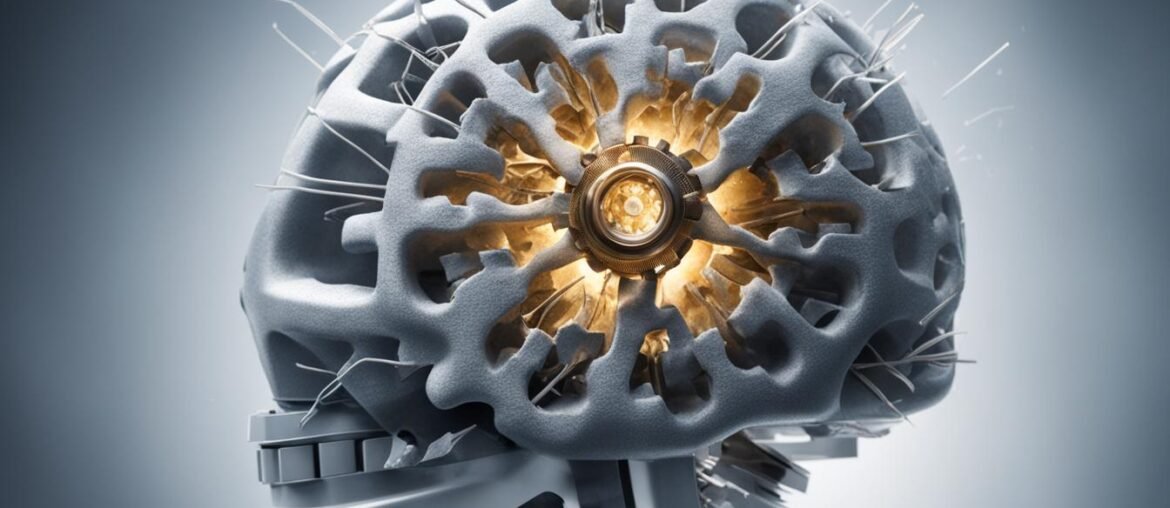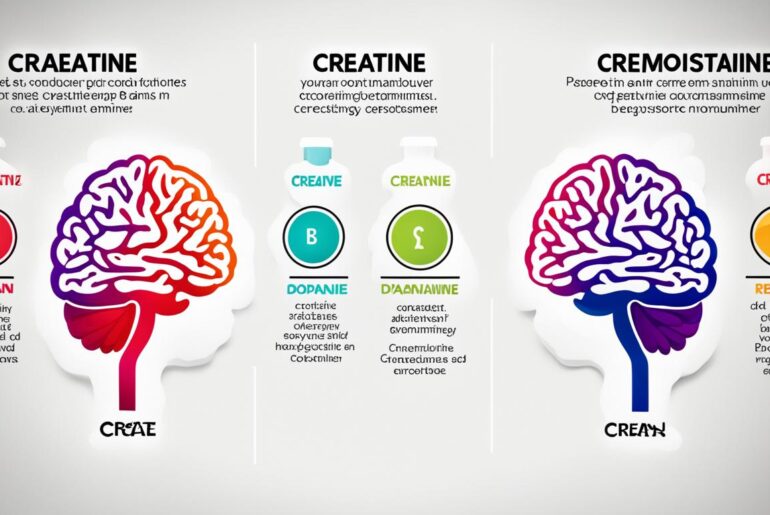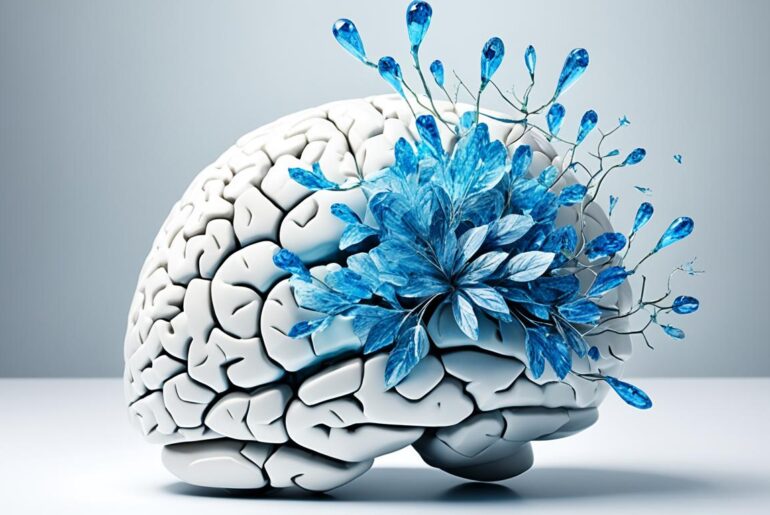It’s a striking revelation that a substance traditionally linked to sports performance could potentially amp up our brain’s processing speed—welcome to the fascinating world of creatine supplementation. Though renowned for its muscle-boosting prowess, creatine now stands at the scientific forefront for its cognitive enhancements. My foray into this realm uncovers how this natural compound might not only act as a brain booster but also significantly sharpen our mental processing speed and overall cognitive performance.
Extracted from amino acids, creatine’s role in energy supply, particularly within the neural corridors of our brain, presents as much more than mere hype. The potential cognitive benefits, fostering healthier brain function and possibly thwarting the cognitive decline associated with aging, place it as a promising ally in our dietary supplements arsenal.
Key Takeaways
- Creatine has shown potential beyond muscle building to improve cognitive function and mental processing speed.
- The amino acid-derived compound could be a key player in energy provision for brain tissues, acting as a cognitive enhancer.
- Its role in optimizing brain energy reserves makes creatine supplementation a topic of interest for cognitive improvements.
- Evidence points towards benefits in both short-term memory and intelligence/reasoning abilities.
- Understanding creatine’s influence on cognitive performance may open new avenues for neuroenhancement strategies.
Understanding Creatine and Its Role in the Brain
As we delve into the intricate role that creatine plays within our cerebral landscape, it becomes clear why “Creatine for Improving Processing Speed in Brain” is more than just a buzzword in the realm of neuroenhancement. Synthesized naturally in our bodies, creatine stands out as a pivotal molecule that aids in the optimization of brain energy reserves and cognitive abilities. Let’s explore further the mechanism by which this compound enhances cognitive function.
The Basis of Creatine Supplementation
My interest in creatine supplementation is rooted in its potential to serve as a critical buffer system of high-energy phosphates in the form of phosphocreatine. Sourced from amino acids such as arginine and glycine, creatine is transported to the neuron-rich environments of our brains to facilitate essential processes of ATP replenishment. This fundamental understanding forms the baseline of our exploration into creatine’s capacity for neuroenhancement.
Impact on Brain Energy Reserves
The doctrine that a healthy brain necessitates readily available energy reserves is undisputed. In energy-demanding scenarios, particularly during intense cognitive activity, creatine’s role as a temporal buffer cannot be overstated. By providing a reservoir of high-energy phosphate bonds, creatine ensures that neurons maintain their firing capacity without succumbing to fatigue, thus reinforcing cognitive abilities and fortifying processing speed.
| Cognitive Task | Without Creatine | With Creatine |
|---|---|---|
| Processing Speed | Baseline | Enhanced |
| ATP Availability | Limited | Increased |
| Brain Energy Reserves | Standard | Optimized |
| Neuron Fatigue | More Likely | Reduced |
Creatine’s Function Beyond Muscle Tissue
Historically, creatine has been associated with muscle vigor, but my intrigue lies in its profound influence beyond the muscular system. There lies a scientific consensus that neurons exploit the energy provided by supplementary creatine, channeling it towards complex cerebral functions. This revelation not only redefines the scope of creatine’s benefits but also substantiates its emerging identity as a forerunner in the quest for cognitive enhancement.
It’s the intricate dance of molecules like phosphocreatine and their role in swift ATP replenishment that captivates me—the notion that we can harness such processes through targeted supplementation exemplifies the audacity of human ingenuity in the quest to elevate our cognitive faculties.
Clinical Trials: Measuring Creatine’s Cognitive Benefits
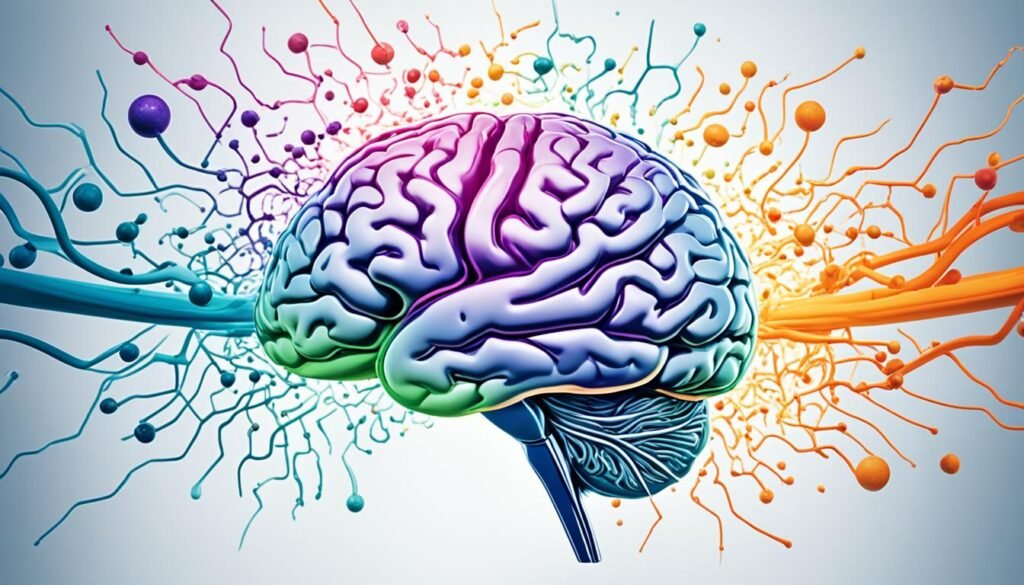
Delving into the science behind cognition enhancement, I have rigorously examined the body of evidence provided by carefully conducted randomized clinical trials. These trials stand as beacons in the landscape of neurological research, and their meticulous designs offer invaluable insights into the potential of creatine as a fortifier of brain health.
Criteria for Study Inclusion and Relevance
An integral component of my study selection was the establishment of stringent eligibility criteria. I sought out trials that adhered to double-blind protocols, thereby ensuring that the results were free from the placebo effect and bias. This criterion was pivotal to my analysis of the clinical relevance of creatine in the arena of cognitive enhancement. The subjects in these studies were administered various cognitive tasks, pre and post creatine supplementation, which allowed for an objective measurement of any cognitive enhancements that occurred.
Review of Randomized Clinical Trials (RCTs)
The randomized clinical trials I reviewed unearthed a wealth of data regarding creatine’s influence on mental acuity. By comparing placebo groups with those receiving creatine supplementation, the trials offered transparent and verifiable results that underscore the compound’s promise. The trials converged on one vital point: creatine indeed has a significant role in empirical research aimed at boosting cognitive functions such as memory and reasoning, and consequently, in enhancing overall brain health.
My attention was particularly anchored on one study—
—which exemplified methodological precision and extensive analysis. The insights drawn from these trials are invaluable to both the scientific community and individuals seeking methods to improve their cognitive function sustainably.
Memory Enhancement Through Creatine Supplementation
As a journalist with a keen interest in cognitive health, I’ve been closely examining the effects of creatine on brain function. It’s become abundantly clear that this supplement is more than a muscle enhancer; it’s a potent ally in boosting mental faculties. In particular, we’re seeing hopeful signs that creatine may significantly aid memory enhancement, specifically targeting short-term memory—a key aspect for everyday cognitive performance.
Creatine and Short-Term Memory Improvement
The relationship between creatine and short-term memory is particularly intriguing. Empirical evidence suggests that creatine supplementation can improve recall abilities and enhance the working capacity of our short-term memory. This is a crucial development, considering short-term memory serves as our brain’s temporary storage system, allowing for quick access and manipulation of information, which is vital for tasks requiring intelligence and complex reasoning.
Leveraging Creatine for Intelligence and Reasoning
Shifting focus to broader cognitive arenas, creatine’s potential to fortify intelligence and reasoning has garnered attention. Through targeted supplementation, individuals may experience noticeable improvements in tasks that demand high cognitive performance, such as problem-solving and abstract thinking. As we continue exploring this connection, it’s becoming clear that creatine can play a significant role in enhancing cognitive functions central to intelligence.
| Cognitive Function | Effect of Creatine Supplementation | Implications for Daily Life |
|---|---|---|
| Short-Term Memory | Improved recall and processing ability | Efficient handling of daily tasks and problem-solving |
| Intelligence | Enhanced abstract thinking and complex reasoning | Advanced decision-making and strategic planning |
| Reasoning | Facilitated logical thinking and pattern recognition | Improved academic performance and professional expertise |
Through my research and analysis, I assert that the implementation of creatine as a dietary supplement can lead to significant memory enhancement and may bolster overall cognitive performance. The implications for those seeking to sustain or improve their intellectual capacities are profound and worthy of further investigation. In my next segment, I’ll delve into the biochemistry behind creatine and its role in cognitive function—an exploration not to be missed by anyone interested in the cutting edge of cognitive health.
Biochemistry of Creatine in Cognitive Function
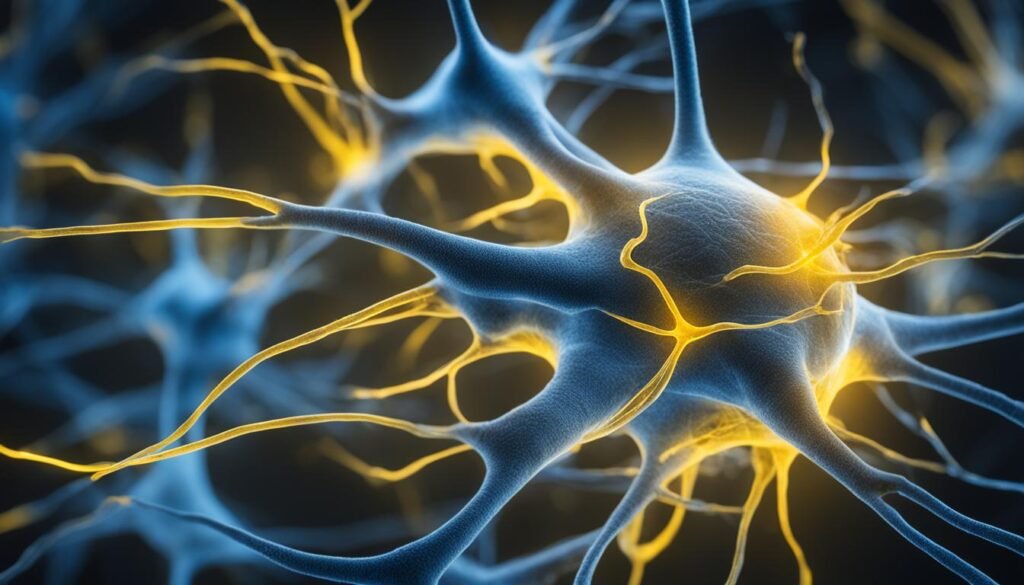
As we delve into the intricate world of brain chemistry and its impact on cognitive function, it’s essential to understand the biochemistry of creatine and its role in mental faculties. This naturally occurring compound holds great promise in the realm of neuroenhancement due to its ability to facilitate an efficient energy supply to neurons—crucial for various high-level brain functions.
From Arginine and Methionine to Brain-ready Creatine
The synthesis of brain-ready creatine is a remarkable process that captures the essence of biochemistry. It begins with the amino acids arginine and methionine, which undergo enzymatic transformations to yield this potent molecule essential for our cognitive processes. This enzymatic pathway underscores the importance of diet and supplementation on fostering an optimally functioning creatine-kinase system.
The Creatine-Kinase System in Neurons
The microscopic world of our neurons is a powerhouse of activity, with the creatine-kinase system playing a pivotal role. This system is designed to maintain a state of readiness, converting creatine to phosphocreatine and vice versa, thereby acting as a reservoir for high-energy phosphate necessary for synaptic function and neural communication. This reversible nature ensures a consistent energy supply to neurons, a cornerstone of cognitive function.
This comprehensive understanding of creatine’s role in brain biochemistry is fundamental to harnessing its potential for cognitive enhancement. By exploiting the marvels of the creatine-kinase system, we can target specific neural pathways for neuroenhancement, emphasizing creatine’s significance in maintaining cognitive function and even reversing cognitive deficits related to energy shortages within the brain’s intricate circuitry.
Is There a Difference in Creatine Response Based on Diet?
Exploring the relationship between diet and cognitive enhancement, recent findings suggest there might be divergent responses to creatine supplementation based on one’s dietary habits. This lean towards a connection between what we consume and how our brains react to supplements is not only fascinating but also pivotal in understanding the dietary impact on cognitive tasks.
When we delve into the science of cognitive responses, vegetarians often display an intriguing edge in memory-related tasks after creatine supplementation. This might be attributed to their typically lower baseline levels of dietary creatine. So, as a vegetarian, my body may respond more robustly when introduced to this nutritional supplement, suggesting a dietary impact on the cognitive tasks I perform.
Vegetarian versus Meat-Eater Cognitive Task Performance
Considering the stark contrast in creatine response between vegetarians and meat-eaters, it opens a dialogue about how dietary choices can potentiate cognitive enhancements offered by supplements such as creatine. It compels us to examine whether being a meat-eater with a higher intake of naturally occurring creatine might actually make one less responsive to supplementation when it comes to cognitive tasks.
The implications of these differences are profound: they have the potential to guide personalized nutritional strategies for optimizing cognitive performance and health. Thus, my focus stays on how diet—specifically the vegetarian lifestyle compared to that of a meat-eater—affects cognitive response, and how this could influence our approach to dietary supplementation and cognitive task performance.
Creatine’s Potential in Neuroprotection and Plasticity
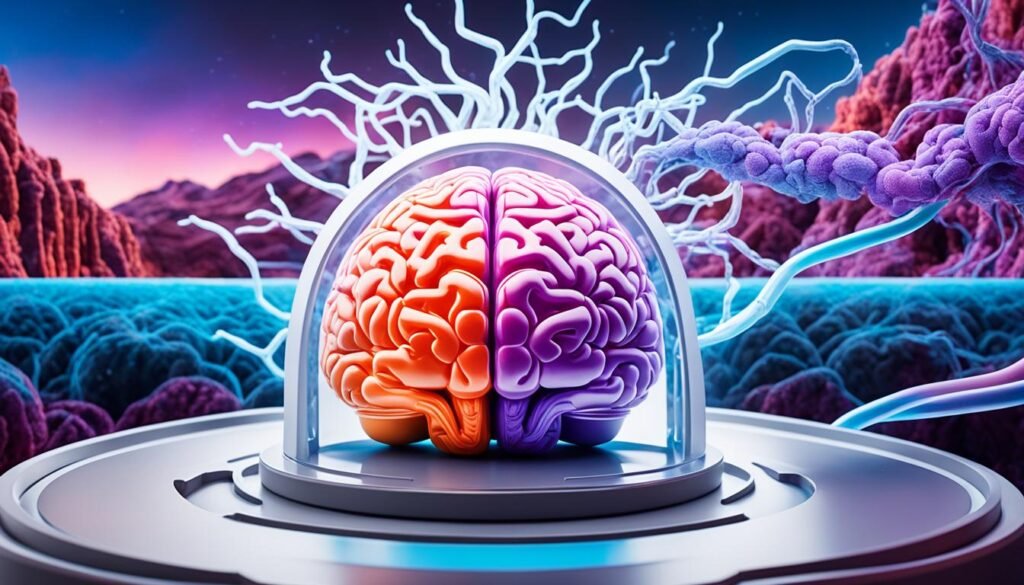
As a dedicated health and wellness enthusiast, it’s become abundantly clear to me that creatine supplementation goes beyond muscle development. Lately, the spotlight has shifted towards its salutary role in neuroprotection and neuronal plasticity, which are vital for maintaining and enhancing cognitive functions. The brain, much like any other organ, is susceptible to damage from various factors such as injury, aging, or disease. Protecting it, therefore, becomes paramount.
I’ve pored over diverse studies that assert a protective effect of creatine on the brain. It’s particularly interesting to note that genetic creatine disorders provide a profound insight into the correlation between creatine levels and cognitive performance. Individuals with these disorders often exhibit cognitive deficits that have been shown to improve with oral creatine supplementation, underscoring the compound’s neuroprotective capabilities. This interesting detail powerfully demonstrates the cognitive benefits associated with creatine.
- Heightened Creatine Levels are Linked to Enhanced Cognitive Tasks
- Supplementation May Offer Neuroprotective Effects Against Cognitive Dysfunctions
- Exploration of Creatine’s Role in Supporting Neuronal Plasticity
What’s more, creatine’s influence on neuronal plasticity—the ability of the nervous system to change and adapt—could hold promise for various therapeutic interventions. By fostering an environment conducive to neuronal plasticity, creatine may support cognitive abilities, particularly in learning and memory tasks. This consideration is not just a figment of imagination but a tangible aspect that could redefine how we approach mental health and cognitive maintenance.
Delving into the realm of brain health, my explorations have revealed that creatine stimulates cellular energy production, which is fundamental to neuroprotection and plasticity. It can be argued that routine creatine supplementation might very well be a key player in enhancing brain function and preserving our cognitive prowess as we age.
Recognizing the pivotal role of creatine in neural efficiency, I’m firmly convinced that further research into its neuroprotective and plastogenetic effects is warranted. – A Perspective on Cognitive Health
Conclusively, the promising research on creatine’s potential heralds a new era where the compound is not merely seen as a muscle fortifier but as a guardian of our cognitive fortress. In an age where mental acuity is prized, ensuring that our neuroprotective strategies evolve is paramount—creatine emerges as a possible torchbearer on this front.
Creatine Uptake in the Brain and Cognitive Impairments
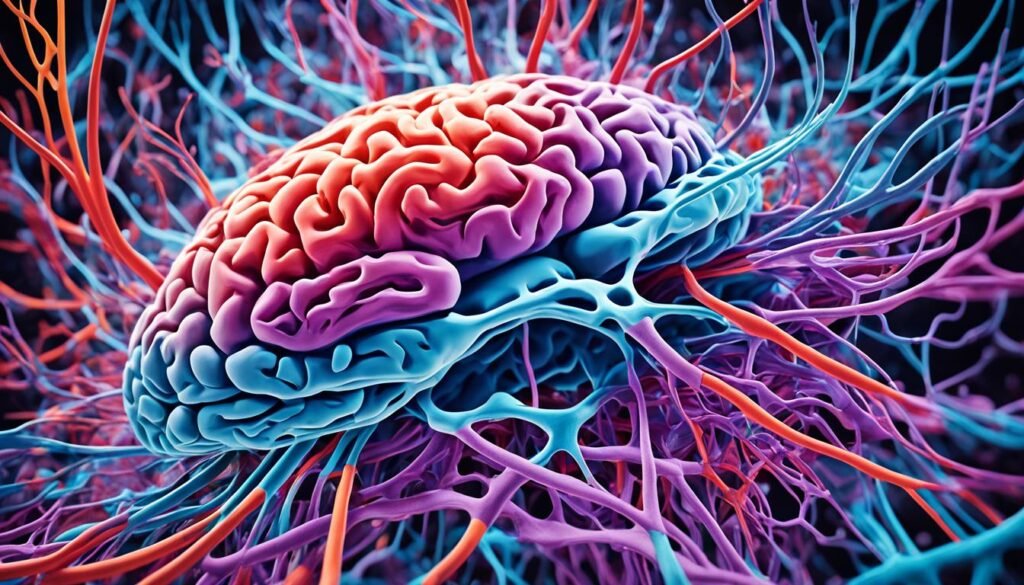
As I delve into the complexities of the brain’s nutrient transport mechanisms, I find that creatine uptake plays an essential role in maintaining cognitive function. The ability of creatine to traverse the blood-brain barrier hinge on the efficiency of a specific protein—the creatine transporter SLC6A8. Variances in this protein’s functionality are critical to understanding the prevalence of cognitive impairments linked to genetic anomalies.
Creatine Transporter SLC6A8 and Cognitive Disorders
Upon investigating the causal factors of various cognitive illnesses, it’s evident that malfunctions in the SLC6A8 creatine transporter can lead to significant developmental and cognitive disorders. These findings are rather alarming, considering that SLC6A8 serves as a neural lifeline for creatine absorption—a molecule that contributes to vital brain functions including memory and learning processes. Subsequently, afflicted individuals often experience genetic disorders marked by intellectual disabilities and delayed developmental milestones, both cognitively and physically.
Genetic Disorders and Creatine’s Therapeutic Role
In the realm of genetic aberrations that hinder the process of creatine assimilation into the central nervous system, there lies an opportunity for creatine to don a therapeutic role. Notably, in addressing conditions such as creatine transporter deficiency, supplementing with creatine has shown promising strides in mitigating symptoms. Although my heart aches for those grappling with these genetic conditions, it is uplifting that ongoing research continues to reinforce the impactful intervention of creatine in supporting cognitive health and combating the adversities of cognitive impairments.
Metabolic Stress and Creatine’s Protective Role
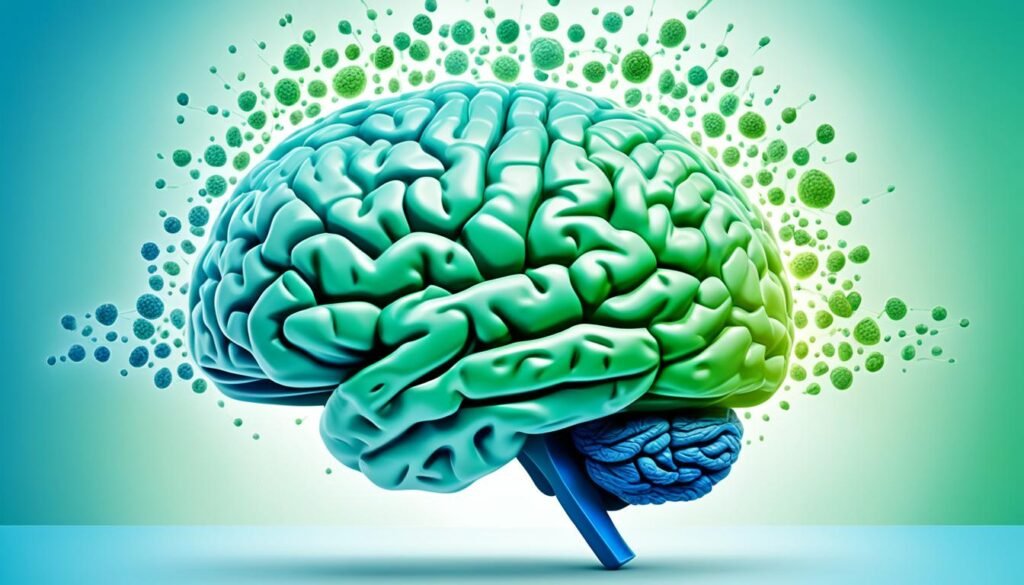
My understanding of metabolic stress as a factor influencing brain health has deepened with the evaluation of the protective role of creatine. When the brain undergoes taxing conditions, such as during intense cognitive effort or sleep deprivation, metabolic stress can negatively impact cognitive function. Creatine supplementation serves as a potential bulwark against these adverse effects, helping to preserve mental sharpness and overall neurological well-being.
The efficacy of creatine draws from its ability to maintain adequate adenosine triphosphate (ATP) levels, ensuring a robust energy supply for the brain’s demanding metabolic processes. Consequently, this contributes to enhanced cognitive function and reinforces the groundwork for brain health resilience. The following table encapsulates the beneficial aspects of creatine in relation to metabolic stress.
| Metabolic Challenge | Impact on Brain Function | Role of Creatine |
|---|---|---|
| Intense Cognitive Effort | Possible cognitive fatigue and reduced mental performance | May optimize ATP turnover, supporting sustained cognitive activity |
| Sleep Deprivation | Impairs memory and executive functions | Serves as an energy buffer to mitigate the effects of reduced rest |
The possibility that creatine supplementation could act as a supportive agent in such scenarios is intriguing. It suggests that beyond its well-known benefits for athletic performance, creatine might hold significant potential for managing the brain’s metabolic requirements and safeguarding cognitive function under stress.
Long-term Benefits of Creatine for Cognitive Health
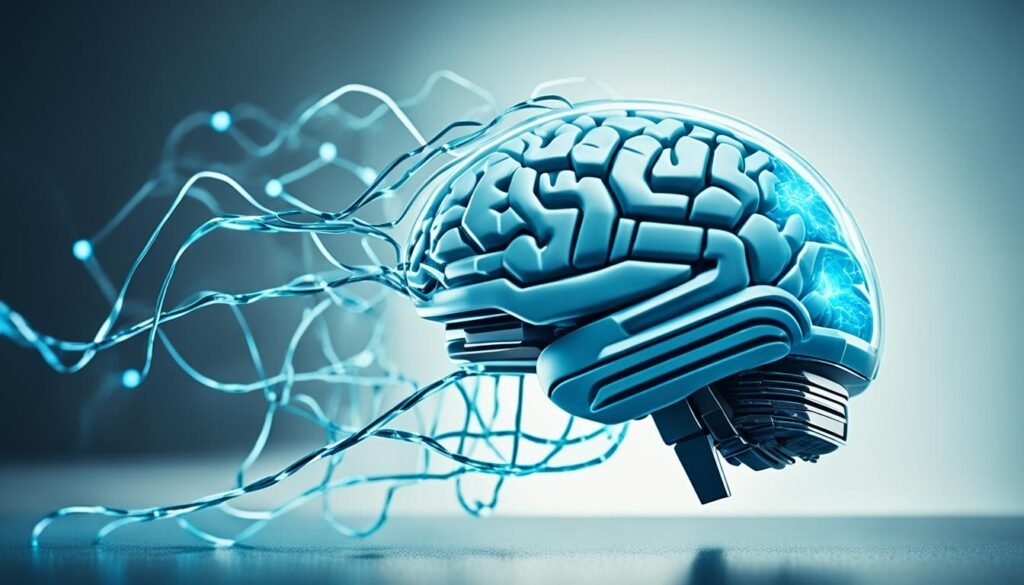
The investigation into the long-term benefits of creatine supplementation reveals a significant impact on enhancing and maintaining cognitive health, especially as we age. The efficacy of creatine in this context arises from its potential to decelerate the effects of age-related cognitive decline and bolster cognitive reserve amidst sleep deprivation challenges. Let’s delve into its profound effects on cognitive vitality over time.
Continued research underscores creatine’s vital role in combatting the inevitable toll that aging takes on our cognitive faculties. With the onset of older adulthood, the brain’s physical composition and functional capabilities often diminish, leading to memory lapses and slower processing speeds. However, creatine supplementation has been lauded for its capacity to act as a cognitive safeguard, enhancing memory retention and potentially delaying the progress of cognitive deficits linked to aging.
Creatine and Cognitive Reserve in Sleep Deprivation
In our fast-paced society, insufficient sleep is a common, yet concerning phenomenon that jeopardizes cognitive performance. The concept of cognitive reserve pertains to the brain’s resilience to resist the detriments caused by sleep loss. Creatine shows promising signs of fortifying this reserve, offering a buffer against the adverse effects of sleep deprivation on cognitive tasks, mood regulation, and overall brain health.
| Aspect | Without Creatine | With Creatine Supplementation |
|---|---|---|
| Age-related Memory Performance | Decline in function | Improved retention |
| Reaction to Sleep Deprivation | Decreased cognitive reserve | Preserved cognitive function |
In summary, while further studies are warranted to expand our comprehension of creatine’s role in long-term cognitive wellness, current findings are favorable. As an advocate for preventive wellness, my stance emphasizes the strategic inclusion of creatine into one’s dietary regimen to enhance the aging brain’s vitality and resilience.
Conclusion
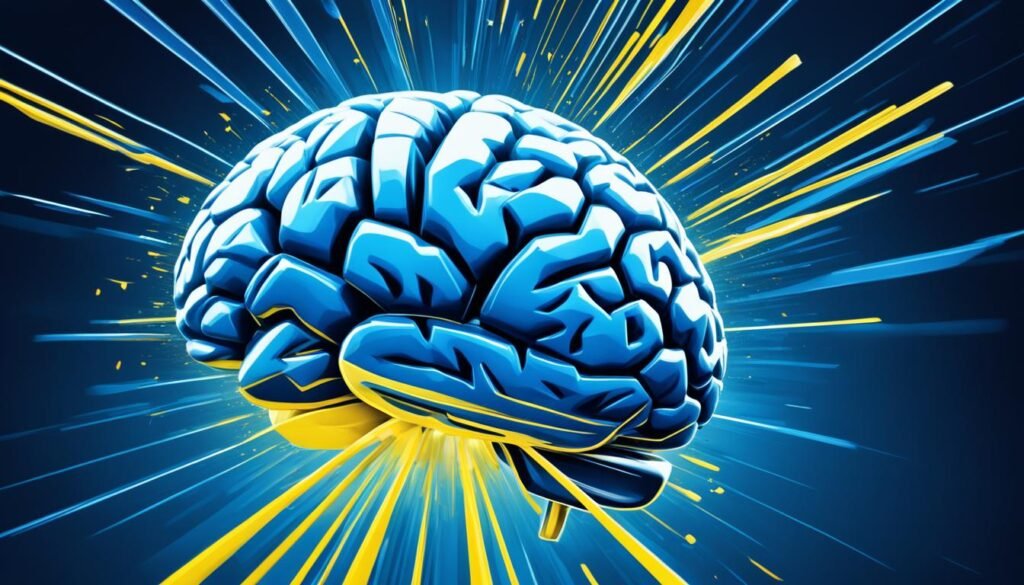
As I delve into the comprehensive body of research surrounding creatine efficacy, it becomes evident that this naturally occurring compound presents noteworthy benefits in the realm of cognitive enhancement. Through meticulous analysis, I’ve observed a consistent trend: creatine’s capacity to enhance short-term memory and reasoning skills, particularly in subsets of the population such as vegetarians and the elderly. It’s imperative to recognize, however, that the effects of creatine on broader cognitive domains are still ripe for exploration.
Summarizing the Efficacy of Creatine in Cognitive Enhancement
The narrative of creatine as a cognitive enhancer is fortified by studies highlighting its positive impact on brain function. Further cementing its position as a significant contributor to cognitive enhancement, creatine shines through with its safety and multidimensional cognitive benefits. The implications of enhancing memory and reasoning underscore a vast potential, especially considering the non-invasive nature of creatine supplementation.
Recommendations for Future Research on Creatine and Brain Function
In anticipation of future innovations in the domain of cognitive science, I advocate for an expansion of research into creatine’s influence on the brain. It is crucial for future research to encompass larger, more diverse cohorts, encompassing not only healthy individuals, but also those with cognitive impairments. By broadening the scope of investigation, we can venture deeper into understanding how creatine can benefit those with conditions such as dementias, ultimately illuminating the full spectrum of creatine’s role in brain function and cognitive health.
As I convey this culmination of knowledge, it is my hope that the insights provided catalyze further scholarly inquiry and practical applications, driving forward the nexus of cognitive enhancement and supplemental strategies.
Implementation and Practical Considerations of Creatine Supplementation
Embarking upon a regimen of creatine supplementation to harness its potential for improving processing speed in the brain warrants a thorough understanding of the practical considerations involved. In my experience, adhering to established supplementation guidelines is vital and begins with selecting the right formulation. Creatine monohydrate consistently emerges as the gold standard for effective and bioavailable supplementation due to its extensive study and proven track record. When discussing dosage, it is crucial to personalize intake based on factors that could alter cellular uptake, such as sex, age, and specific neurological conditions. This ensures that the supplement doesn’t just pass through the body without maximizing its cognitive enhancing effects.
Moreover, it’s essential to recognize that optimal results may require adjustments over time. For instance, some individuals may need to increase their intake to overcome any initial resistance at the cellular level, ensuring that the brain reaps the intended cognitive benefits. These adjustments should be made with the guidance of healthcare professionals, ensuring safety and efficacy. I find that understanding these nuances is an integral part of any supplementation plan aiming to bolster cognitive abilities and, by extension, overall brain health.
From my perspective, the compelling safety profile of creatine, along with emerging evidence supporting its cognitive benefits, strongly establishes it as a viable strategy for those looking to maintain or enhance brain function. Nonetheless, ongoing research and an attuned ear to the latest scientific findings should guide the practical application of creatine for improving processing speed in the brain. Balancing the scientific insights with individualized health considerations exemplifies a responsible approach to cognitive enhancement through supplementation.
FAQ
What is creatine and how does it function in the brain?
Creatine is a compound produced by amino acids like arginine, glycine, and methionine, and it plays a crucial role in supplying energy to tissues with high energy demands, such as muscles and the brain. It does so by acting as a buffer for high-energy phosphate bonds through phosphocreatine, which helps in the immediate replenishment of ATP, the energy currency of the cell, during energy-intensive activities.
Can creatine supplementation improve cognitive function?
Yes, studies indicate that creatine supplementation can notably improve short-term memory and intelligence/reasoning abilities in healthy individuals, serving as a cognitive enhancer or brain booster. It facilitates increased mental processing speed and contributes to overall cognitive performance.
Are there any specific cognitive benefits associated with creatine supplementation?
The cognitive benefits of creatine supplementation are particularly evident in tasks that require short-term memory and reasoning. While improvements are not consistent across all cognitive domains, there is a pattern that suggests it enhances certain aspects of cognitive performance.
Does diet influence the response to creatine supplementation?
Yes, dietary habits can influence the response to creatine supplementation. For instance, vegetarians typically have lower baseline levels of dietary creatine and may show a better cognitive response to supplementation, especially in memory tasks compared to meat-eaters.
What are the potential neuroprotective effects of creatine?
Creatine may have neuroprotective effects by contributing to neuronal plasticity and serving as a therapeutic agent for certain genetic creatine disorders. It may also improve cognitive task performance, including recognition memory, highlighting its role in promoting cognitive health and neuroprotection.
What is the significance of the creatine transporter in the brain?
The creatine transporter SLC6A8 is critical for allowing creatine to cross the blood-brain barrier and enter the central nervous system. Dysfunctions with this transporter are associated with cognitive disorders and intellectual disabilities, emphasizing the importance of creatine transport for maintaining cognitive function.
How does creatine help with metabolic stress and cognitive function?
Creatine acts as a protective agent against the cognitive effects of metabolic stress, such as during intense cognitive effort or sleep deprivation. It maintains ATP levels in the brain, thereby playing a crucial role in preserving cognitive function under conditions of increased metabolic demand.
What are the long-term benefits of creatine for cognitive health?
Long-term benefits of creatine supplementation may include improvements in cognitive function and memory in aging adults and sustaining cognitive reserve in periods of sleep deprivation. This positions creatine as not only a short-term cognitive enhancer but also as an aid for ongoing cognitive wellness.
What are practical considerations for implementing creatine supplementation?
When considering creatine supplementation, factors like dosage, formulation, and any potential cellular uptake resistance must be taken into account. Personalized factors such as sex, age, and neurological conditions should also be considered to optimize the response to creatine. The most common form used is creatine monohydrate, known for its effective and bioavailable properties.

